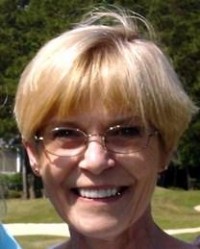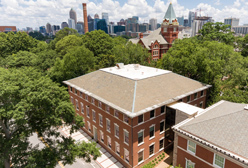Sponsored Research
The Institute of International Education has awarded $344,988 to Professors Vicki Galloway and Bettina Cothran and Associate Professor Stuart Goldberg in the School of Modern Languages for the project, "Extending the Georgia Tech Model of Language and Culture Immersion: Overseas "Connection" Programs in Arabic, Chinese, and Korean and Domestic Immersion in Farsi."
Adam Stulberg, professor in The Sam Nunn School of International Affairs has been awarded $60,013 by the Korea Advanced Institute of Science & Technology for the project "Exploring Future-Oriented Partnership Between the Republic of Korea and the U.S. in Nuclear Energy and Fuel Cycle Development."
Other Funding
The Coca-Cola Foundation has awarded $1.13M to Campaign Georgia Tech to sustain and enhance the programs of The Sam Nunn School of International Affairs, including Coca-Cola 1st Generation College Scholarships, study abroad programs, and professorships for research in natural resource governance and sustainability.
What Does Georgia Tech Think?
Selected Press for Ivan Allen College of Liberal Arts
|
Brown on the Age of Coal-Fired Generators
In response to a call to shut down many of Georgia's coal-fired generators, which average more than 40 years old, Marilyn Brown, a professor in the School of Public Policy, says that some have plenty of life left in them. Care of the plant plays an important role in its lifespan. Source: GPB News, November 13, 2012
DiSalvo on the Human Element in Technology
“It’s human resources, at the end of the day,” said Carl DiSalvo, assistant professor in the School of Literature, Media, and Communication, that makes the difference in applying technology successfully to social movements such as the recent presidential campaign. Source: Saporta News, November 13, 2012
Ries on the Economics of Charter Schools
Georgia school districts that serve almost 90 percent of the state's students stand to gain financially when a state-authorized charter school opens in their community, according to a study by Christine Ries, professor in the School of Economics. No local funding goes to the state-approved charter school, meaning all local property and sales taxes remain with the district to be spent on the remaining students. Source: Peach Pundit, November 6, 2012; Amplifier, November 5, 2012
Taylor on Presidential Accountability
“Put simply, if ‘it’s the economy, stupid,’ then we need to make stronger efforts to properly judge economic performance and to assign credit and blame where they are most deserved,” says Mark Zachary Taylor, assistant professor in The Sam Nunn School of International Affairs. His published rankings of U.S. presidents based on their economic choices “are meant to constitute a scientific step in this direction.” Source: RTT, November 4, 2012; UPI, November 5,2012
Garver on History of China-India Relations
"The question of responsibility for the crisis in Tibet figured prominently in the contentious talks between Mao Zedong and Soviet leader Nikita Khrushchev in Beijing on 2 October 1959. After a complete disagreement over Taiwan, Khrushchev turned to India and Tibet, saying: 'If you let me, I will tell you what a guest should not say - the events in Tibet are your fault,' wrote John Garver, professor in The Sam Nunn School of International Affairs, in his book, China's Decision for War with India in 1962." Source: Asia Times, November 6, 2012
Bogost on the Ubiquity of Video Games as they turn 40
"As with photography, television, what makes an art powerful is not that it is placed in a gallery, but that it becomes so commonplace we don't notice it anymore. A domestication happens. We have to face the music of what that means, that one of the challenges of maturity is recognizing this is OK," says Ian Bogost, professor in the School of Literature, Media, and Communication. Source: Military.com, November 2, 2012
Boston on October Jobs Report
"In my economics 101 class, I would give today’s Jobs Report a grade of B, even though the unemployment rate increased slightly," said Thomas D. Boston, professor in the School of Economics. Source: CNN Newsroom, November 2, 2012
November 26, 2012
7:00 pm
November 28, 2012
2:30 pm
November 30, 2012
12:00 pm
November 30, 2012
2:00 pm
December 1, 2012
10:00 am
December 8, 2012
10:00 am
|
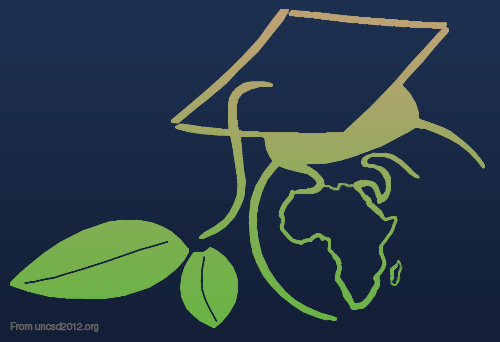
|
New Coca-Cola Grant Supports International Affairs Studies for First-Generation Georgia Tech Students
Georgia Tech students who are the first in their family to attend college will have the opportunity to gain global perspectives and experience abroad through a new grant from the Coca-Cola Foundation.
The $1.13 million pledge to Campaign Georgia Tech will provide scholarships that encourage first-generation college students to take courses in The Sam Nunn School of International Affairs and will underwrite complementary study and work abroad programs in Latin America, Asia, and Europe.
“Preparing our students to be good global citizens and to lead in an increasingly globalized marketplace is a vital aspect of Georgia Tech’s strategic plan,” said Georgia Tech President G. P. “Bud” Peterson. “This generous grant from the Coca-Cola Foundation will help us make significant progress toward this goal by focusing resources on study and work abroad opportunities around the world.”
The grant is designed to benefit both undergraduate and graduate students. In addition to tuition, fees, and study/work abroad opportunities, the funding will also support internships and career development programs.
Joseph E. Bankoff, chair of The Sam Nunn School of International Affairs, said, “Through this grant, we will be able to provide multifaceted and transformational learning experiences for students who otherwise would not have them. They will enter Georgia Tech as first-generation college students and graduate as first- generation global citizens. We are grateful to the Coca-Cola Foundation for its support of this program and its continued support of The Sam Nunn School of International Affairs.”
As part of Coca-Cola’s sustainability initiative, the grant will also fund two, three-year term professorships in The Nunn School for research in natural resource governance for sustainability. Faculty will explore the global policy and technical issues concerning access to clean water, alternative energy, environmental protection, and economic sustainability.
“Our grants invest in the ingenuity of grassroots partners who contribute to the well-being of communities around the world,” said Ingrid Saunders Jones, chairperson of The Coca-Cola Foundation. “With our support, these partners work to improve the quality of life for their families, their neighbors, their cities, and their countries.”
|

|
Gates Foundation Grant Funds New Massive Online Open Courses
Whether one believes that free massive open online courses (MOOCs) signal a fundamental shift or are simply a new iteration in distance learning, higher education's great global experiment is accelerating and Georgia Tech and Ivan Allen College are on the curve.
In July, Georgia Tech announced its partnership with Coursera, an online course platform developed by two Stanford scientists. The non-profit company is rapidly gaining partner institutions both within and outside the U.S., and nearly two million people from 196 countries have enrolled in at least one course. More than 140,000 students have registered for courses taught by Georgia Tech professors and the first class began in October.
Many existing MOOCs tend to feature advanced topics, but through a new $150,000 grant awarded by the Bill & Melinda Gates Foundation to the Georgia Tech Research Institute (GTRI), three new MOOCs are targeting those who have yet to pursue or complete a college degree by covering introductory subjects.
One of the them is First-year English Composition 2.0, a course proposed by a team from the School of Literature, Media, and Communication under the leadership of Rebecca Burnett, Director of the Writing and Communication Program, and Karen Head, Director of the Communications Center. The LMC team is working with Georgia Tech's Center for 21st Century Universities (C21U) to launch the course through Coursera.
“These Gates Foundation awards address one of higher education’s most pressing problems: bending the cost curve and improving learning outcomes for introductory courses,” said Rich DeMillo, director of C21U. “The Georgia Tech courses being funded by these grants all represent innovation in pedagogy, teaching and technology. If we are successful, courses like these will be a shift in both quality and cost for the vast majority of American college students.”
Dan Greenstein, director of Postsecondary Success at the Bill & Melinda Gates Foundation said, “We believe having diverse options for faculty and students that meet a wide array of learning needs and styles can enhance student engagement, improve educational outcomes and increase college completion rates. We are eager to learn from and share the data that will be generated from these investments in MOOCs.”
Georgia Tech was the only institution under the Gates grant to garner funding for three courses. The other two courses are in physics, and psychology. Each will be available free through Coursera in January 2013. Other non-grant related online courses are being developed by IAC faculty.
|

|
Economic Impact of Hurricane Sandy is Underestimated
This commentary was written by Thomas "Danny" Boston, professor in the School of Economics, in a blog post for The Gazelle Index. Read the full post here. Image courtesy Reuters.
The economic impact of Sandy has been estimated at $50 billion, about one-half the impact of Hurricane Katrina. While the loss of life has not been nearly as devastating as was the case for Katrina, the destruction of property and hardship imposed on persons who were in the path of Sandy is unimaginable.
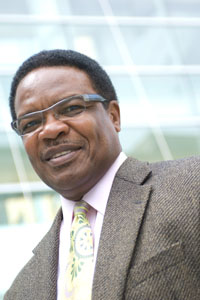 As the focus turns to rebuilding, some analysts are underestimating the economic impact of the storm. They believe, mistakenly, that dollars flowing into the northeast region from the federal government, and the expenditures made by households to rebuild will, in the final analysis, add jobs and income, ultimately offsetting the damage. However, this view is shortsighted. As the focus turns to rebuilding, some analysts are underestimating the economic impact of the storm. They believe, mistakenly, that dollars flowing into the northeast region from the federal government, and the expenditures made by households to rebuild will, in the final analysis, add jobs and income, ultimately offsetting the damage. However, this view is shortsighted.
What they are looking at is the positive multiplier effect of new dollars flowing into the region. Each dollar spent becomes income to someone else who also spends. The eventual effect is to create more income and spending than was injected originally. Furthermore, it is generally the case that every $1 million of new construction dollars adds about 22 jobs. This sounds good on the surface.
What this logic fails to consider is the negative multiplier effect caused by the destruction of the hurricane in the first place. That is, every dollar of spending taken out of the economy as a result of the hurricane also had a multiplier effect, which worked in the opposite direction.
In the long run, the positive multiplier effect caused by rebuilding will not likely be greater than the negative multiplier effect caused by the hurricane’s disruption. In plain language, at the end of the day the region will probably be much worse off, no matter how much rebuilding occurs.
Sandy is having a devastating effect in the Northeast region. Estimates put the total property damage between $10 billion-$20 billion and insurance losses at $5 billion-$10 billion. The overall impact has been estimated between $30 billion-$50 billion considering disruption of air travel, interruption of retail sales, insurance losses, the shutdown of Wall Street, interruption of power supply, and destruction of the infrastructure and power grid. This does not even consider the loss of life and adverse effect on the quality of life.
This total estimate is about one-half the cost of Hurricane Katrina in 2005, which was estimated at $108 billion, without considering the 1200 deaths it caused. It is difficult to know the full extent of hurricane Sandy. Unlike Katrina, which disrupted a central hub for shipping, oil, and tourism, Sandy has disrupted the economy and infrastructure of the world’s busiest commercial center.
Furthermore, while people focus on the economic gains of reconstructing the area (which is a short-run boost) what they fail to recognize is that most of the expenditures represent substitute purchases. That is, when people spend money rebuilding, they must therefore give up other purchases they would have made, such as a new car or a vacation.
The Gulf coast has been rebuilt since Katrina, but it is a stretch to argue that things are better in the region now than they were before the hurricane, as a result of the reconstruction expenditures.
Like Katrina, most people affected by Sandy will rebuild, but a significant number will relocate away from the region and the coast, fearing a repeat of the disaster. In the future, it will also be more difficult to persuade corporations to locate major supply hubs in the disaster struck region. This is the challenge that Japan is confronting as a result of the devastating tsunami.
On balance, the Northeast region devastated by Sandy will be reconstructed. However, it will likely never regain the complete economic footing that was washed away by the floodwaters. Reconstruction dollars will add jobs and income, but in the final analysis the spending is simply replacing wealth assets that were lost during the hurricane. Replacing lost assets requires money that would have been spent on other goods and services, but must now be spent rebuilding.
|
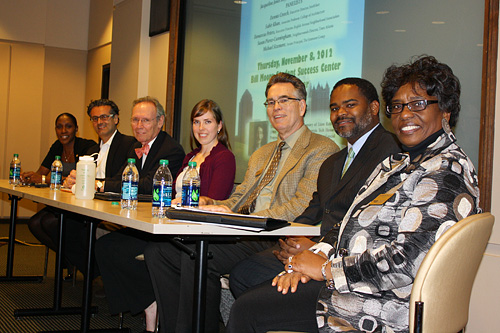
|
Shaping A Sustainable City: Liam’s Legacy Symposium Invites Action on Scales Grand and Small
How will Atlanta become a top tier green city by 2035? Can anyone build a green building? Do poor neighborhoods care about sustainability? What big businesses are entering the business of sustainability? How is altruism meaningful as a sustainability concept?
These and other wide-ranging topics wove seamlessly together during the “Liam’s Legacy Symposium: Shaping a Sustainable City” on November 8. Panelists from Atlanta organizations addressed the concrete and the conceptual, policy and practical application, and inspiration for action on scales small and large.
“We’ve got a plan!” was the pacesetting mantra offered by keynote speaker, Denise Quarles, Director of the Office of Sustainability for the City of Atlanta. Quarles heads Mayor Kasim Reed’s efforts to reinvent Atlanta as a top-tier city for sustainability by 2035. Her presentation showed Atlanta’s strengths, progress, and challenges in key green measures. For example, the city doesn’t make the top 50 for bikeability, but plans to double its bike lanes/mileage in the next few years. It is abundantly forested, yet has only 4.6% green space, compared to 19% for New York City. It rates in the top 10 for green buildings and is doing well in green jobs. It ranks second in recycling facilities, but few Atlantans actually recycle.
Moderated by Dean Jacqueline Royster, panelists included long-time local advocates for sustainability. Dennis Creech of Southface Energy Institute, who has spent decades making sustainability easy to understand and apply, discussed the results of Southface’s project to build the greenest building possible using off-the-shelf materials. Susan Pierce-Cunningham of Trees Atlanta highlighted the power of volunteerism to bring about change. Demarcus Peters of the English Avenue Neighborhood Associatin, offered examples such as a project that tracked tire dumping to demonstrate that even neighborhoods where residents are struggling just to "keep the lights on" can be active in sustainability. Peter’s noted that the single biggest factor determining a person’s support for sustainability is a connection to the issue at an early age. Sabir Khan, associate professor in the College of Architecture, and CoA graduate, Michael Sizemore, of The Sizemore Group offered frameworks for thinking about interdisciplinary problem solving, resources, and societal challenges.
Addressing the audience of students, who were primarily from Ivan Allen College of Liberal Arts, engineering, and architecture, Sizemore said, “You are learning a way of thinking that is important to the future” for shaping cities, town centers, and campuses.
The symposium was organized by the Georgia Tech Honors Program headed by Greg Nobles, professor in the School of History, Technology, and Society. It honors the memory of Liam Rattray (1989-2011), an honors program student, a student in public policy, and a campus leader in sustainability. Rattray had just graduated when he was killed by a drunk driver.
|

|
Westside Story: Connecting Communities
The neighborhoods surrounding Georgia Tech’s Atlanta campus have struggled for decades with drugs, crime and poverty. Those communities need help—and the Institute is reaching out.
As a child in the 1960s, Jacqueline Royster often rode through the streets of Atlanta’s English Avenue community as her mother commuted to Atlanta University. Later, as a student at Spelman College, Royster knew the Westside neighborhoods as loci of civil rights history and the home of friends—“very nice, working-class” places, she recalls.
In the 1940s and ’50s, after decades as a white neighborhood, English Avenue had transitioned to a mostly black population. It was home to a growing black middle class, a proud place where families prospered and kids left home for college. English Avenue raised stars like Gladys Knight and budding business leaders like onetime presidential hopeful Herman Cain. Martin Luther King Jr. raised his family nearby.
But in 2010, when Royster returned to Atlanta as dean of Tech’s Ivan Allen College of Liberal Arts, she went on a tour of English Avenue and saw a very different place.
By the time Royster made her return, the challenges facing the once-quiet Westside were legion: crack cocaine, heroin; HIV and AIDS; struggling schools; flooding from Proctor Creek, lead-contaminated soil. Residents jobless, homeless, dropped-out or drifting after release from jail. It was a swirling nexus of poverty and crime.The intervening years had not been kind to the Westside. In the 1970s, English Avenue’s population began to decline as some families left for Atlanta’s growing suburbs. Bars and dance clubs opened along the neighborhood’s south side. English Avenue’s pool halls and restaurants began to sell liquor. And as the neighborhood became known as an entertainment hotspot, more and more families moved out, returning only for church on Sundays. Residents interviewed for a 2008 Georgia Tech architecture lab project said the change was solidified by the mid-1980s when drugs arrived and crime exploded.
Those who remain in the neighborhood fear that the city will demolish the whole place, or that housing prices will force them out.
Mere blocks away from one of the most prestigious schools in the country, home to world-changing technological advancements, how had English Avenue faltered? Royster knew of Georgia Tech’s contributions around the globe, but she wondered what the Institute was doing for its own community.
She began to dig, and her questions turned up a number of research, teaching and volunteer programs that tie Georgia Tech to Atlanta’s Westside. Tech faculty pushed for new ways to use technology to help residents. Students in an honors course designed projects to address neighborhood challenges. Student service groups went into the neighborhood every week to mentor children.
Some projects were little more than ideas; some had been going on for years. But organizers were rarely in touch with each other or even aware of each other’s efforts.
“We have a habit of being very innovative and entrepreneurial—you see something, you go do it,” Royster said of Georgia Tech. “You don’t necessarily take the time to build community around it.”
But now that’s all changing. Tech leaders, faculty and students are partnering with the residents of the Home Park, Vine City, Centennial Park and English Avenue neighborhoods on two partnerships.
Royster and Alan Balfour, dean of the College of Architecture, united Tech’s leaders, faculty and students with interest in the Westside communities to form the Georgia Tech Westside Task Force. Its goal is to connect efforts acrossTech, so that by partnering and sharing resources, the groups can accomplish more.
The second effort is the Westside Communities Alliance, which seeks to build or strengthen partnerships with external organizations such as businesses, nonprofits, neighborhood associations, public schools, police and fire departments, other universities and residents. Their mission is to share Tech’s expertise and culture of service with its neighbors.
“We can pick up as much trash, do community cleanups, have job fairs … you know, change can happen from within,” said Demarcus Peters, director of the English Avenue Neighborhood Association, who works with the alliance. “But when the community is that far gone, there needs to be some structural support. … What Georgia Tech has let me know [is] there are people thinking the same way I’m thinking, that something should be done.”
Already, alliance partners have organized financial literacy workshops for Westside residents and pushed Tech’s participation in community festivals and clean-ups. There is still much to do, including a strategic assessment of the alliance’s projects and its successes, Royster said. But Tech is committed to coordinating these Westside efforts into a coherent approach that will exemplify the university’s motto of “Progress and Service.”
“Our students are learning, but they are giving their time and energy. Our faculty is researching, but it is also working with communities,” Royster said.
Still she knows it will take more than websites and workshops to make progress.
Continue reading this article which appears in the November 2012 issue of the Georgia Tech Alumni Magazine.
|
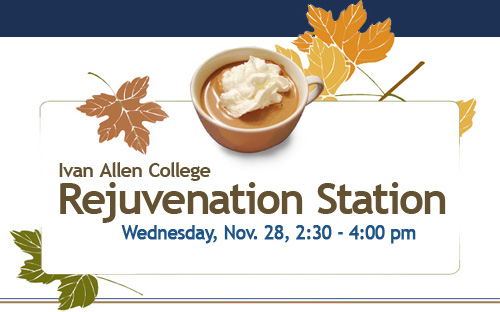
|
Take a Break and Join Us for a College-Wide Event November 28th
Ivan Allen College of Liberal Arts students, faculty, and staff are invited to take a break and celebrate our community at IAC's first ever college-wide fall event. Come out to the "Rejuvenation Station" for holiday treats, hot drinks, and free stuff!
Event details:
Ivan Allen College Rejuvenation Station
Wednesday, November 28, 2012
2:30-4:00pm
Bill Moore Student Success Center (behind Tech Tower)
There will be free cupcakes, hot chocolate, and coffee, plus giveaways. Click here to let us know if you plan to drop by. Join the fun!
|
IAC AWARDS
Fellowships, scholarships, and grants awarded to the IAC community
|
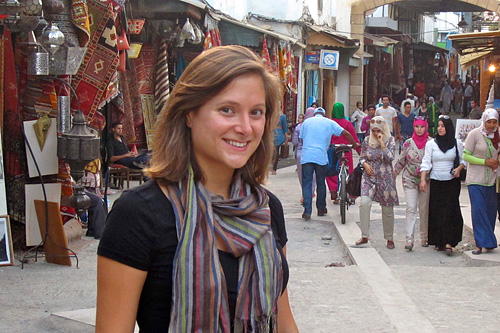
|
INTA Alumna Blends Technology with Policy at the U.S. State Department
(Lundberg in Rabat, Morocco, where she conducted a CO.NX training at the U.S. Embassy)
In the spring of 2009, Kristin Lundberg’s team at the U.S. State Department was tasked with a project that had no precedent: organize a live, interactive webcast of a speech by the Secretary of State.
Secretary Hillary Rodham Clinton was scheduled to be in Brussels, Belgium and address a group of European students. American officials at embassies and consulates across Europe were offered the opportunity to organize viewing parties with local youth leaders who would watch the Secretary speak, ask questions, and comment - online in real time.
“Inviting people to comment online while she was speaking was something very new to people in the State Department,” said Lundberg. “The idea that we’d have a chat going during her speech was really unconventional at the time.”
Lundberg, who earned a joint degree in International Affairs and Modern Languages (IAML), is well-acquainted with taking on a challenge. Her current post as a foreign affairs officer at the State Department required 14 interviews over the course of two days for one of only a few hundred fellowship slots coveted by nearly 700 finalists. She had roughly a 5% chance of getting the job at State, but succeeded. She’s also pretty proud of passing Georgia Tech’s required undergraduate math classes.
But during that spring three years ago, Lundberg could only sit tight and cross her fingers that the server didn’t crash.
“When I think about our setup, it was the most dinky setup you had ever seen,” she recalled. “We had no budget and we were still building our office.”
Despite the obstacles, the webcast went off without a hitch. Her team managed to assuage the worries of staffers who felt online commenting would distract from the talk, and Secretary Clinton’s voice was perfectly audible in embassies miles away from Brussels.
“I think people are very nervous about technology,” said Lundberg. “Technology is not perfect. You are taking a risk, but the payoff is worth it.” More people are reached, and more voices are heard.
Lundberg appreciates how trivial the technological concerns of just a few years ago seem today. But that first webcast was significant for her career and for the promotion of digital public diplomacy by the State Department.
“Events like that one really paved the way for the future of our office,” she said.
She works in CO.NX (pronounced “connex”), an office within the Bureau of International Information Programs (IIP) at the U.S. State Department. IIP is the State Department’s public diplomacy (PD) communications bureau, leading it's support for U.S. Embassy PD efforts and engagement with overseas audiences. In a government built on acronyms, CO.NX doesn’t actually stand for anything. It’s a play on the verb “connect.” CO.NX makes State's panel discussions, expert web chats, student alumni discussions, and guest speaker events virtually accessible, free of charge to anyone in the world with an Internet connection.
After serving as a senior producer for several years, Lundberg is now the lead training coordinator and visits embassies worldwide training them to do what CO.NX does domestically. The custom-designed training is two-part: first, it provides the technical tools and knowledge to enable embassies and consulates to set up their own online broadcasts, and second, it enables understanding of how to effectively convey messages through the medium.
Lundberg says her job is “to blend technology with policy.” It’s something she learned during her time at Georgia Tech, and she credits it as a significant contributing factor in her landing the Presidential Management Fellowship at the State Department after graduate school in 2008. She was competing for a fellowship along with graduates from Harvard, Yale, Tufts, and others.
“The main thing I knew that was different for me was my Georgia Tech background,” said Lundberg.
So she played to her advantage. During interviews she made it clear that she had the required mix of technology and liberal arts training for the job. As an undergraduate she organized speakers and managed workshops for The Sam Nunn Bank of America Policy Forum. She said that she “grumbled like everyone else” about the IAC requirements to take calculus, computer science, and management courses, but she discovered during group projects in graduate school that she was the only one trained in Excel macros.
Lundberg told interviewers, “I haven’t just written papers or done research. I have actually implemented my knowledge. I’ve taken policy and turned it into action.” She added, “I’m not afraid of technology. I’ll help you learn. And I know international affairs.”
That mix of skills got her in the door.
“It can be very challenging for employers to find candidates that understand not only the technical side of things, but can also communicate well, both orally and in writing. You really have to have both skill sets if you want to be competitive in today’s market and Ivan Allen College certainly emphasizes this throughout the coursework,” she said.
Lundberg sees digital skills and familiarity with technology as a training requirement for future government officials.
“Nothing beats face-to-face. That’s the cornerstone of what we do,” said Lundberg. “But considering our resources we have to do more with less all the time.”
Thinking back to that first webcast in Brussels, Lundberg knows you can do quite a lot with a little. To her, the small challenges that may come with uniting technology with policy are always worth the payoff of connecting the world.
Related Links
|
Murray Receives GT Women's Leadership Faculty Award
Janet Murray, associate dean for Ivan Allen College Research and Faculty Affairs and a professor in the School of Literature, Media, and Communication, received a Women of Distinction Faculty Award at the Georgia Tech Women's Leadership Conference (WLC) reception, held November 2, 2012. Murray was nominated for her 13 years of service as an academic leader in the Ivan Allen College and for her commitment to innovative work relevant to this year's theme for the WLC awards, "New Horizons."
The WLC awards honor women staff, faculty, undergraduate, graduate, and Georgia Tech alumnae for their exemplary leadership and inspiration of the Georgia Tech community and future generations of campus women.
|
Clark is Reappointed to SPIE Committee
|
|
Jennifer Clark, associate professor in the School of Public Policy, has been re-appointed to the 2012 Engineering, Science & Technology Policy Committee (ESTeP) of the International Society for Optics and Photonics (SPIE). The ESTeP promotes understanding at all levels of policy decision-making about those issues that affect the well-being of the optical science and engineering communities worldwide. This committee also advises the SPIE Board and other Society groups on ways to expand the Society's role in science and engineering policy. Founded in 1955 and with current membership of more than 180,000 in more than 170 countries, SPIE advances an interdisciplinary approach to the science and application of light. |
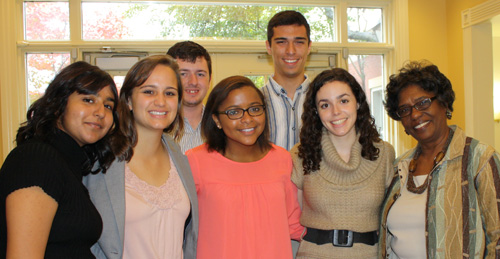
|
IAC Announces the 2012-2013 Dean's Scholarships
Front row from left: Rose Anthony, Erin Sapp, Chloe Stargel, Lauren Llerandi, and Dean of the Ivan Allen College Jacqueline Jones Royster. Back row: Andrew Wirt and Andres Marcuse-Gonzalez.
The Ivan Allen College of Liberal Arts is proud to announce this year's recipients of Dean's Scholarships.
More than 180 high school students competed this year for the Ivan Allen College of Liberal Arts Dean's Scholarships for incoming freshman. The applicants were evaluated based upon academic excellence, visionary leadership, and outstanding public service. Five students were selected for academic year 2012-2013. They are: Andrew Wirt, Andres Marcuse-Gonzalez, Andy Williams, and Rose Anthony.
They join second year Dean's Scholars: Thomas Marion, Lauren Llerandi, Erin Sapp, Chloe Stargel, and Katerina Jenkins.
Scholarship recipients receive a $2000 award their first year, with opportunity to continue the scholarship, based upon merit, for three subsequent years. In addition to the financial award, Dean's Scholars meet personally with Dean Royster and Associate Dean for Undergraduate Studies John Tone, as well as Georgia Tech executive administrators and faculty. They have further opportunities designed to enhance their development as problem solvers, innovators, top-tier leaders, and global citizens.
Application for Dean's Scholarships is a competitive, merit-based process. Up to six new scholarships will be awarded each spring to high school students who enroll for fall semester in majors within the Ivan Allen College of Liberal Arts.
|
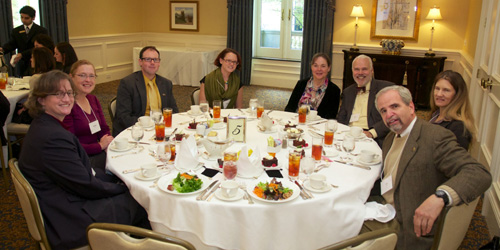
|
HTS Students Receive Homer Rice Award
Congratulations to the six students and alumni of the School of History, Technology, and Society who received a 2012 Homer Rice Leadership Award.
Recipients were recognized at Dr. Rice's annual luncheon for alumni of his Leadership Fitness Program, held at the Capital City Club on October 26, 2012. President Peterson and his wife Val also attended.
The award recipients are:
- Angel Callahan, alumna
- Jennifer Green, doctoral student
- Elizabeth Haven Hawley, alumna
- Les Leighton, alumnus
- John Miller, doctoral student
- Nathan Moon, alumnus and Associate Director for Research of the Center for Advanced Communications Policy at Georgia Tech
Rice served as Georgia Tech's athletic director from 1980 to 1997. His book "Leadership Fitness: Developing & Reinforcing Successful, Positive Leaders" trains readers to differentiate between positive and negative leadership.
|

|
Four IAC Students Awarded Distinguished DC Internships
Congratulations to four Ivan Allen College students on being recipients of the DC Internship Program, sponsored by the Georgia Tech’s Office of Government and Community Relations.
The IAC recipients are:
 Katherine Mitchell, second-year student in the School of Public Policy from McDonough, Ga. (top photo) Katherine Mitchell, second-year student in the School of Public Policy from McDonough, Ga. (top photo)
Amanda Shojaee, third-year international affairs student in The Sam Nunn School of International Affairs from Alpharetta, Ga. (middle photo)
Priya Verma, third-year student in The Sam Nunn School of International Affairs and the School of Modern Languages from Alpharetta, Ga. (bottom photo)
Donna Welles, first-year master’s student in The Sam Nunn School of International Affairs from Austin, Tx. (no photo available)
Five Georgia Tech students received the internship this year. Now in its fourth semester, the program is designed to align with one of Tech’s strategic goals to foster the fundamental characteristic of public service in all of its graduates. Selected students work full-time in offices in and around Washington, DC for 10 weeks in the summer or 16 weeks in the spring and fall.
 “The DC Internship Program empowers our students to engage in the federal policy process in ways that would not be possible on campus, while laying the groundwork for a future career,” said Rafael L. Bras, provost and executive vice president of academic affairs for Georgia Tech. “The DC Internship Program empowers our students to engage in the federal policy process in ways that would not be possible on campus, while laying the groundwork for a future career,” said Rafael L. Bras, provost and executive vice president of academic affairs for Georgia Tech.
As part of the program, students receive a stipend and mentorship from Georgia Tech government relations and professional practice staff. Once selected, students are required to secure a federal government position (with members of Congress, Congressional Committees or executive branch offices) that is aligned with their own interests and professional aspirations. Previous positions have been held in the Office of Congressman Phil Gingrey (R-GA); the U.S. Department of Justice-Law and Policy Section; and the Office of the Chief Medical Officer-Department of Health and Human Services, Administration for Children and Families, to name just a few.
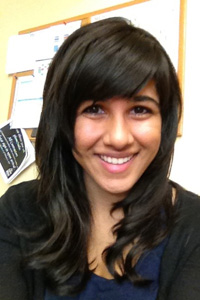 Donna Welles is continuing her studies at Georgia Tech after earning an undergraduate degree from the University of Texas-Austin in Russian, Eastern European, and Eurasian Studies. She hopes to land an internship that will bring her one step closer to becoming a government analyst. Donna Welles is continuing her studies at Georgia Tech after earning an undergraduate degree from the University of Texas-Austin in Russian, Eastern European, and Eurasian Studies. She hopes to land an internship that will bring her one step closer to becoming a government analyst.
McDonough, Ga.-born Katherine Mitchell sees the DC Internship Program as a path toward influencing the nation’s science and technology policy.
“A lot of students only get involved [in policy discussions] when it’s election season,” Mitchell noted. “I think it’s important for us to stay involved in current events because, whatever you’re interested in, there will be a policy issue around it.”
Georgia Tech students are increasingly attracted to government career paths, in response to rising demand for “problem solvers,” and for the variety of opportunities available. The Georgia Tech DC Internship program is open to both undergraduate and graduate students of all majors, and is eligible for course credit.
|
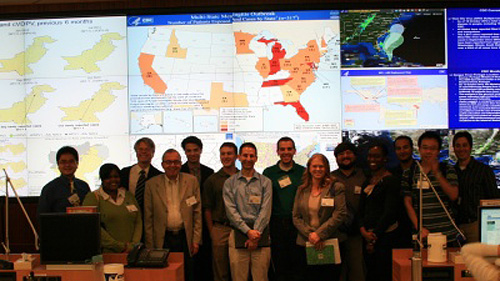
|
Sam Nunn Security Program Fellows Visit CDC
By special permission, the Sam Nunn Security Program (SNSP) Fellows in The Sam Nunn School of International Affairs toured the nerve center for U.S. response to global health crises.
The tour took place October 26th during the Fellows' visit to the Centers for Disease Control and Prevention (CDC) in Atlanta. They gained an insider's perspective on how the CDC’s $10 million Situation Room facilitates rapid mobilization and deployment of U.S. resources in response to global public health threats.
The core of the visit was meetings with CDC officials who explained the agency's processes for enacting U.S. public health policy and the roles of science in those processes. They met with CDC officials including Cathleen Walsh, Director of Policy Research, Analysis and Development; public health analyst Andre Verani of the Center for Global Health who discussed world-wide efforts by the U.S. government to combat AIDS; and a presentation by visiting Swedish health expert, Hans Rosling, who deconstructed conventional assumptions about the relationship between wealth and health.
The Fellows will continue their visits to government agencies this spring in Washington, D.C. where they’ll study the relationship between policy making and science.
|
Remembering Our Colleague Bobbie Krabe
She was the first person many of us saw as we walked in the door for work and the last one at night. She always offered a welcoming smile and, often, an amusing story. No matter how bad a day it was, she almost always found humor in the situation and made everyone lighten up and laugh. And when it came to Georgia Tech football, she was your go-to person.
Our dear colleague, Bobbie Krabe, passed away peacefully at her home on November 11, 2012, after an 18-month battle with lung cancer that forced her to retire from Ivan Allen College. She was 72 years young.
Bobbie was an administrative professional in the dean’s office. She began in 1997 as a receptionist then took on additional responsibilities for the Habersham building and for college receptions held there.
Dean Jacqueline Royster said, “Bobbie’s warm, gentle, and helpful ways helped us to get through our days. She lost a hard fought battle with cancer, but she inspired us all with her optimism and strength until the very end.”
Born in New Iberia, Louisiana, Bobbie graduated from St. Mary's Dominican College in New Orleans. Prior to Georgia Tech, she worked for Equifax in Atlanta as a receptionist and building coordinator.
Bobbie and her husband Lou were huge fans of Georgia Tech football and never missed a home game. Two of Bobbie’s four daughters are alumnae. They are Kim Barnes (IM, 1984) and Kelly Spiggle (INTA, 1993). She is survived also by another daughter, Kristie Carter, and five grandchildren.
Bobbie was feisty, even in her final days. She was planning her memorial services, “MY party” as she called them, perhaps thinking about the years of parties that she'd overseen for college faculty, staff, and students. She had just been out to enjoy a Cajun seafood boil, and told colleagues in Habersham that she was planning to stop by for a visit.
“She told me that she had a lot to do and wasn’t going anywhere until January,” said Carol Silvers, administrative professional in the Dean’s Office. “It turned out that God had a different schedule in mind. She was a bright spirit and we all miss her greatly.”
|
|












 As the focus turns to rebuilding, some analysts are underestimating the economic impact of the storm. They believe, mistakenly, that dollars flowing into the northeast region from the federal government, and the expenditures made by households to rebuild will, in the final analysis, add jobs and income, ultimately offsetting the damage. However, this view is shortsighted.
As the focus turns to rebuilding, some analysts are underestimating the economic impact of the storm. They believe, mistakenly, that dollars flowing into the northeast region from the federal government, and the expenditures made by households to rebuild will, in the final analysis, add jobs and income, ultimately offsetting the damage. However, this view is shortsighted.



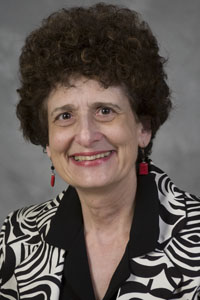
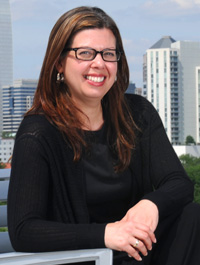



 Katherine Mitchell, second-year student in the School of Public Policy from McDonough, Ga. (top photo)
Katherine Mitchell, second-year student in the School of Public Policy from McDonough, Ga. (top photo) “The DC Internship Program empowers our students to engage in the federal policy process in ways that would not be possible on campus, while laying the groundwork for a future career,” said Rafael L. Bras, provost and executive vice president of academic affairs for Georgia Tech.
“The DC Internship Program empowers our students to engage in the federal policy process in ways that would not be possible on campus, while laying the groundwork for a future career,” said Rafael L. Bras, provost and executive vice president of academic affairs for Georgia Tech. Donna Welles is continuing her studies at Georgia Tech after earning an undergraduate degree from the University of Texas-Austin in Russian, Eastern European, and Eurasian Studies. She hopes to land an internship that will bring her one step closer to becoming a government analyst.
Donna Welles is continuing her studies at Georgia Tech after earning an undergraduate degree from the University of Texas-Austin in Russian, Eastern European, and Eurasian Studies. She hopes to land an internship that will bring her one step closer to becoming a government analyst.
